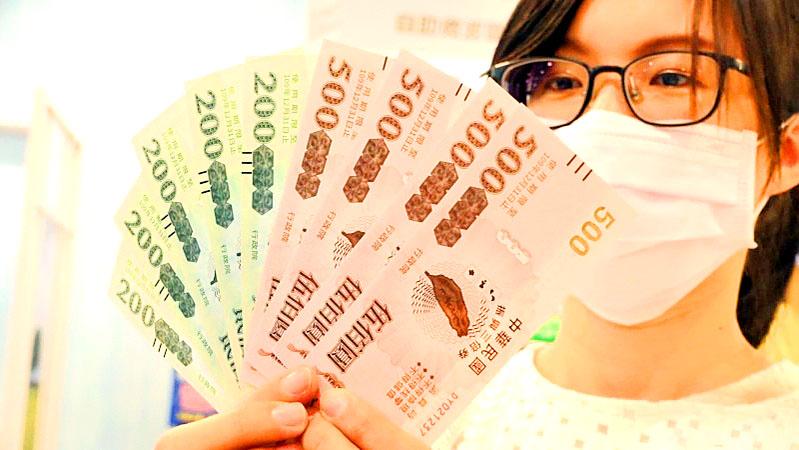Democratic Progressive Party Legislator Chung Chia-pin (鍾佳濱) and independent Legislator Freddy Lim (林昶佐) yesterday urged the Executive Yuan to issue vouchers in smaller denomination as part of its stimulus plan to benefit small businesses.
The lawmakers issued the call after the Cabinet on Thursday said that the upcoming round of government stimulus vouchers would have a monetary value of NT$5,000, although a timetable for launching the program has not yet been decided.
Chung said that the voucher program should issue 20 vouchers in NT$100 denominations, five in NT$200 denominations, two NT$500 denominations and one NT$1,000 voucher.

Photo: Wu Chi-lun , Taipei Times
Chung added that the program should be limited to small sums, as vouchers of smaller denominations would be easier for stores that sell daily necessities to accept.
Only designated small stores should be allowed to accept the vouchers, Chung said, adding that the vouchers’ use should be limited to retail stores, restaurants, hotels and art exhibitions.
Lim said that businesses in his Wanhua District (萬華) constituency that were most affected by the COVID-19 outbreak, such as night markets, traditional markets and small-scale stores, rely on small-sum transactions.
Association of Chain and Franchise Promotion Taiwan director Wu Yung-chiang (吳永強) said that the voucher program should prioritize businesses affected by the pandemic.
Those not greatly affected should not benefit from the program, he said.
Citing statistics from financial institutions, Wu said that 42 percent of the previous Triple Stimulus Voucher program went to purchasing daily goods, 24 percent was spent purchasing goods in department stores and 14 percent went to room and board during travel.
Wu said that if the new program follows that trend, restaurants would stand to gain little, as only 6.3 percent of vouchers were spent eating and drinking, and 0.9 percent was spent on arts and humanities.
In response, the Ministry of Economic Affairs’ Department of Commerce Deputy Director-General Chen Mi-shun (陳秘順) said that the voucher program is still being discussed by the Executive Yuan, and details on the distribution method and the beneficiaries have not been determined.
The government would announce the program once it has been finalized, he added.

The manufacture of the remaining 28 M1A2T Abrams tanks Taiwan purchased from the US has recently been completed, and they are expected to be delivered within the next one to two months, a source said yesterday. The Ministry of National Defense is arranging cargo ships to transport the tanks to Taiwan as soon as possible, said the source, who is familiar with the matter. The estimated arrival time ranges from late this month to early next month, the source said. The 28 Abrams tanks make up the third and final batch of a total of 108 tanks, valued at about NT$40.5 billion

Two Taiwanese prosecutors were questioned by Chinese security personnel at their hotel during a trip to China’s Henan Province this month, the Mainland Affairs Council (MAC) said yesterday. The officers had personal information on the prosecutors, including “when they were assigned to their posts, their work locations and job titles,” MAC Deputy Minister and spokesman Liang Wen-chieh (梁文傑) said. On top of asking about their agencies and positions, the officers also questioned the prosecutors about the Cross-Strait Joint Crime-Fighting and Judicial Mutual Assistance Agreement, a pact that serves as the framework for Taiwan-China cooperation on combating crime and providing judicial assistance, Liang

A group from the Taiwanese Designers in Australia association yesterday represented Taiwan at the Midsumma Pride March in Melbourne. The march, held in the St. Kilda suburb, is the city’s largest LGBTQIA+ parade and the flagship event of the annual Midsumma Festival. It attracted more than 45,000 spectators who supported the 400 groups and 10,000 marchers that participated this year, the association said. Taiwanese Designers said they organized a team to march for Taiwan this year, joining politicians, government agencies, professionals and community organizations in showing support for LGBTQIA+ people and diverse communities. As the first country in Asia to legalize same-sex

MOTIVES QUESTIONED The PLA considers Xi’s policies toward Taiwan to be driven by personal considerations rather than military assessment, the Epoch Times reports Chinese President Xi Jinping’s (習近平) latest purge of the Chinese People’s Liberation Army (PLA) leadership might have been prompted by the military’s opposition to plans of invading Taiwan, the Epoch Times said. The Chinese military opposes waging war against Taiwan by a large consensus, putting it at odds with Xi’s vision, the Falun Gong-affiliated daily said in a report on Thursday, citing anonymous sources with insight into the PLA’s inner workings. The opposition is not the opinion of a few generals, but a widely shared view among the PLA cadre, the Epoch Times cited them as saying. “Chinese forces know full well that